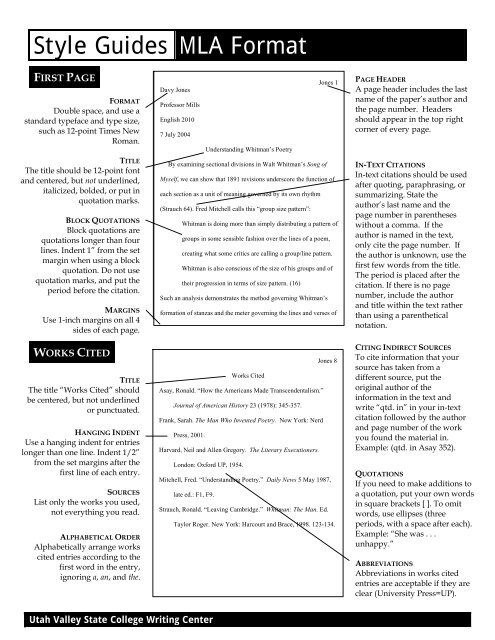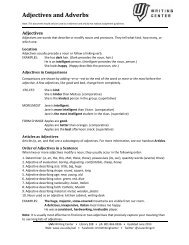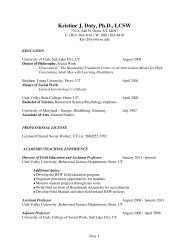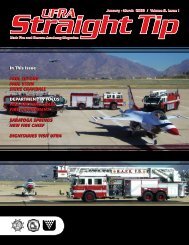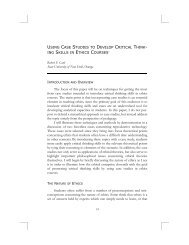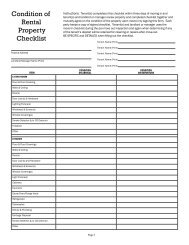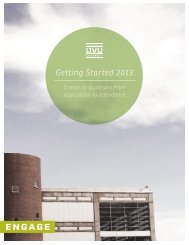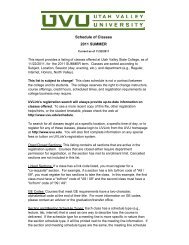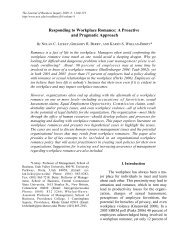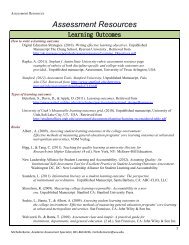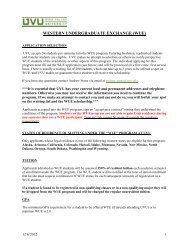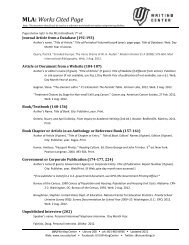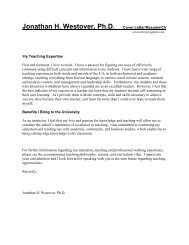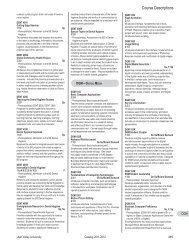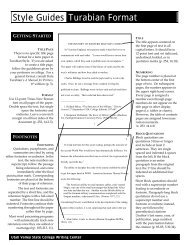Style Guides MLA Format - UVU
Style Guides MLA Format - UVU
Style Guides MLA Format - UVU
You also want an ePaper? Increase the reach of your titles
YUMPU automatically turns print PDFs into web optimized ePapers that Google loves.
<strong>Style</strong> <strong>Guides</strong> <strong>MLA</strong> <strong>Format</strong><br />
T<br />
FIRST PAGE<br />
FORMAT<br />
Double space, and use a<br />
standard typeface and type size,<br />
such as 12-point Times New<br />
Roman.<br />
TITLE<br />
The title should be 12-point font<br />
and centered, but not underlined,<br />
italicized, bolded, or put in<br />
quotation marks.<br />
BLOCK QUOTATIONS<br />
Block quotations are<br />
quotations longer than four<br />
lines. Indent 1” from the set<br />
margin when using a block<br />
quotation. Do not use<br />
quotation marks, and put the<br />
period before the citation.<br />
MARGINS<br />
Use 1-inch margins on all 4<br />
sides of each page.<br />
T<br />
WORKS CITED<br />
TITLE<br />
The title “Works Cited” should<br />
be centered, but not underlined<br />
or punctuated.<br />
HANGING INDENT<br />
Use a hanging indent for entries<br />
longer than one line. Indent 1/2”<br />
from the set margins after the<br />
Utah Valley State College Writing Center<br />
Psychology of Codes Jones 1<br />
Davy Jones<br />
Running head: THE PSYCHOLOGY OF CODES<br />
Professor Mills<br />
English 2010<br />
7 July 2004<br />
Understanding Whitman’s Poetry<br />
The Psychology of Western Military Codes<br />
By examining sectional divisions in Walt Whitman’s Song of<br />
John Q. Cipher<br />
Myself, we can show that 1891 revisions underscore the function of<br />
Utah Valley State College<br />
each section as a unit of meaning governed by its own rhythm<br />
Dr. Simon Gilmore<br />
(Strauch 64). Fred Mitchell calls this “group size pattern”:<br />
Psychology 4890<br />
Whitman is doing more than simply distributing a pattern of<br />
groups in some sensible fashion over the lines of a poem,<br />
creating what some critics are calling a group/line pattern.<br />
Whitman is also conscious of the size of his groups and of<br />
their progression in terms of size pattern. (16)<br />
Such an analysis demonstrates the method governing Whitman’s<br />
formation of stanzas and the meter governing the lines and verses of<br />
Works Cited<br />
Asay, Ronald. “How the Americans Made Transcendentalism.”<br />
Journal of American History 23 (1978): 345-357.<br />
Frank, Sarah. The Man Who Invented Poetry. New York: Nerd<br />
Press, 2001.<br />
Harvard, Neil and Allen Gregory. The Literary Executioners.<br />
London: Oxford UP, 1954.<br />
Jones 8<br />
first line of each entry. QUOTATIONS<br />
SOURCES<br />
List only the works you used,<br />
not everything you read.<br />
ALPHABETICAL ORDER<br />
Alphabetically arrange works<br />
cited entries according to the<br />
first word in the entry,<br />
ignoring a, an, and the.<br />
Mitchell, Fred. “Understanding Poetry.” Daily News 5 May 1987,<br />
late ed.: F1, F9.<br />
Strauch, Ronald. “Leaving Cambridge.” Whitman: The Man. Ed.<br />
Taylor Roger. New York: Harcourt and Brace, 1998. 123-134.<br />
PAGE HEADER<br />
A page header includes the last<br />
name of the paper’s author and<br />
the page number. Headers<br />
should appear in the top right<br />
corner of every page.<br />
IN-TEXT CITATIONS<br />
In-text citations should be used<br />
after quoting, paraphrasing, or<br />
summarizing. State the<br />
author’s last name and the<br />
page number in parentheses<br />
without a comma. If the<br />
author is named in the text,<br />
only cite the page number. If<br />
the author is unknown, use the<br />
first few words from the title.<br />
The period is placed after the<br />
citation. If there is no page<br />
number, include the author<br />
and title within the text rather<br />
than using a parenthetical<br />
notation.<br />
CITING INDIRECT SOURCES<br />
To cite information that your<br />
source has taken from a<br />
different source, put the<br />
original author of the<br />
information in the text and<br />
write “qtd. in” in your in-text<br />
citation followed by the author<br />
and page number of the work<br />
you found the material in.<br />
Example: (qtd. in Asay 352).<br />
If you need to make additions to<br />
a quotation, put your own words<br />
in square brackets [ ]. To omit<br />
words, use ellipses (three<br />
periods, with a space after each).<br />
Example: “She was . . .<br />
unhappy.”<br />
ABBREVIATIONS<br />
Abbreviations in works cited<br />
entries are acceptable if they are<br />
clear (University Press=UP).
<strong>Style</strong> <strong>Guides</strong> <strong>MLA</strong> <strong>Format</strong><br />
The following list includes some of the most common sources included in a Works Cited page. For more<br />
information, see pages 144-235 of the <strong>MLA</strong> Handbook for Writers of Research Papers, 6 th edition.<br />
BOOK BY A SINGLE AUTHOR<br />
Last Name, First Name and Initial (if given). Title. Location: Publisher, Year.<br />
Wilson, Frank R. The Hand: How Its Use Shapes the Brain. New York: Pantheon, 1998.<br />
BOOK BY TWO OR MORE AUTHORS<br />
Last Name, First Name and Initial (if given), and First Name Last Name. Title. Location: Publisher, Year.<br />
Welsch, Roger L., and Linda K. Welsch. Cather's Kitchens. Lincoln: U of Nebraska P. 1987.<br />
NOTE: If a reference has more than three authors, give the first author's name and "et al." Example: Jones, Bob, et al.<br />
TEXT IN AN ANTHOLOGY OR EDITED BOOK<br />
Last Name, First Name (of author of the article). “Article Title.” Anthology Title. Ed. First Name Last Name (of<br />
editor). Location: Publisher, Year. pages.<br />
Gomez, Isabel. “From Within.” Stories from the South. Ed. Thomas Nitsche. New York: Plume, 1992. 82-92.<br />
ARTICLE IN A REFERENCE BOOK<br />
“Article Title.” Book Title. Edition Number. Publication Year.<br />
“Noon.” The Oxford English Dictionary. 2nd ed. 1989.<br />
ARTICLE IN A MAGAZINE<br />
Last Name, First Name. “Article Title.” Magazine Title Day Month Year: pages.<br />
Mehta, Pratap Bhanu. “Exploding Myths.” New Republic 6 June 1998: 17-19.<br />
ARTICLE IN A JOURNAL<br />
Last Name, First Name. “Article Title.” Journal Title Volume Number (Year): pages.<br />
Craner, Paul M. “New Tool for an Ancient Art.” Computers and the Humanities 25 (1991): 303-13.<br />
ARTICLE IN A NEWSPAPER<br />
Last Name, First Name. “Article Title.” Newspaper Title (omit beginning articles) [Location (if newspaper is not<br />
national and the location is not named in the title)] Day Month Year, Edition Information: pages.<br />
Jones, Anna. “Deadly Change.” Daily Post [Billings] 1 June 2002: B3+.<br />
PERSONAL INTERVIEW OR COMMUNICATION<br />
Last Name, First Name (person being interviewed). Interview type (Personal, Telephone, E-mail). Day Month Year.<br />
Takyrbashev, Lewis P. E-mail interview. 8-12 June 2003.<br />
DOCUMENT FROM AN INTERNET SITE (Include all information that is available and applicable.)<br />
Last Name, First Name. “Document Title.” If applicable, information about print source that the document comes<br />
from, following the format for that specific source type (see above examples). Site Title. Editor’s name. Version<br />
or edition number. Date of electronic publication or last update. Name of sponsoring organization. Day Month<br />
Year (of access) .<br />
“Orphaned Cossacks.” 1 July 2002. Association for the Worldwide Advancement of Humanities. 1 May<br />
2003 .<br />
WORK FROM LIBRARY SUBSCRIPTION SERVICE<br />
(The first part of the citation will vary, depending on whether the work comes originally from an online book, periodical article, etc.<br />
[See <strong>MLA</strong> Handbook, pages 216-224]. For works from print sources, give all standard information for such a source that is provided.)<br />
Specific source information (see above). Database Name (if known). Name of Service. Library Name. Date of Access<br />
.<br />
Wakefield, Lawrence. “Cooling Trend in Antarctica.” Futurist May-June 2002: 15. Academic Search Premier.<br />
EBSCO. City U of New York, Graduate Center Lib. 22 May 2002 .<br />
Source: Gibaldi, Joseph. <strong>MLA</strong> Handbook for Writers of Research Papers. 6 th ed. New York: The Modern Language Association of America, 2003.<br />
Utah Valley State College Writing Center


